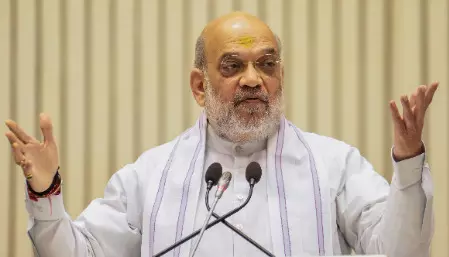Shah launches 3 tech platforms to improve speed, precision of disaster management agencies

New Delhi: Union Home Minister Amit Shah unveiled three major tech platforms on Monday to improve the speed and precision of the country's disaster management agencies.
The home minister launched the Integrated Control Room for Emergency Response (ICR-ER), National Database for Emergency Management Lite 2.0 (NDEM Lite 2.0) and Flood Hazard Zonation Atlas of Assam at the two-day annual conference of relief commissioners, secretaries of disaster management and State Disaster Response Forces.
In a post on X, Shah said the three platforms "will equip our disaster management apparatus with the speed and precision of the new age technologies".
"The ICR-ER will prompt real-time response to disaster(s) across the nation by streaming satellite data to rescue agencies, and the NDEM Lite 2.0 will provide our response forces spread across nooks and corners with the agility to confront any calamity as a single unit," he said.
The atlas of Assam will guide flood control authorities to realise the goal of flood mitigation by providing them with real-time data related to floods, their impact, and water levels in rivers, the minister said.
Assam Chief Minister Himanta Biswa Sarma said in a post on X that the Flood Hazard Zonation Atlas of Assam, a satellite-based analysis of flooding patterns in the state launched by the home minister, will help in regulating development in floodplains, promoting flood resilient agriculture, supporting crop insurance schemes and preparing disaster management plans.
"My gratitude to the Hon'ble Union Home Minister for releasing this much needed Atlas which will go a long way in mitigation of issues related to floods," he said.
Addressing the event, Shah said that due to climate change and global warming, the entire world is grappling with disasters and there is a need to move forward with environmental conservation as a core component.
"In the coming days, while everyone is fully prepared to tackle disasters, there is also a need to address their root causes," he said.
"Not only has our capacity to handle disasters been increased, but it has also been enhanced and extended to the tehsil level. Attention has been given to speed, as saving lives during a disaster is of utmost importance," he added.
The home minister said efficiency has been improved through the use of cutting-edge technology and the dedicated approach of disaster response forces.
Additionally, by providing accurate forecasting and early warnings, society has been made aware and successfully engaged in relief and rescue operations, he said.
Shah said that during the Modi government's tenure, there has been a significant shift in the approach related to disaster management.
Earlier, the approach was relief-centric, but now the goal of "zero casualty" has been successfully achieved and the focus has shifted from relief-centric to a comprehensive and integrated approach, he said.
He also emphasised the importance of anticipating future disasters, conducting advanced research, compiling global ideas in this field, and adapting them to suit India's geographical conditions.



